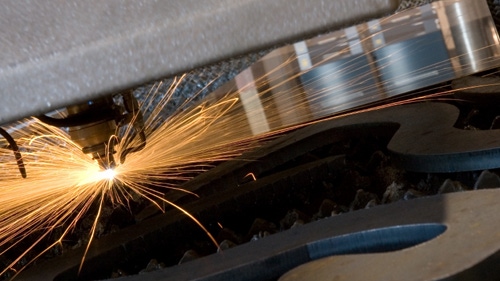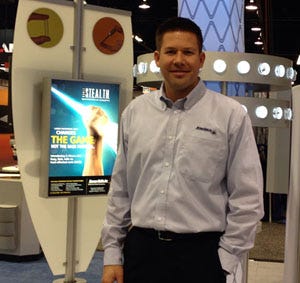New Laser Technology Can Make Bioresorbable Stents More Robust
A medtech supplier at the MD&M West Expo describes a laser-cutting technology that he believes will transform how implants like stents and heart valves are cut and used.
February 12, 2014

|
Brian Hrouda, directors of sales and marketing at Norman Noble Inc., talks about the STEALTH technology at MD&M West Expo in Anaheim, California |
Innovation at the supplier and contract manufacturer level is not often noticed or talked about.
Large medical device makers like Medtronic or Covidien or St. Jude Medical often get the credit for developing breakthrough medtech products, but sometimes they could be powered in part by innovation by an unsung supplier.
At the MD&M West Expo in Anaheim, California that draws scores of medical suppliers from around the country, one contract manufacturer was promoting a technology it believes to be groundbreaking.
Highland Heights, Ohio-based Norman Noble Inc., which bills itself as the largest contract manufacturer of Nitinol-based implants and devices, believes it has hit upon a new laser machining technology that can fundamentally alter the way nitinol-based and other implants are cut.
Called STEALTH, it is a new laser machining technology that can cut minute nitinol metallic implants to be used in self expanding or bioresorbable stents, but do so without affecting that minute part by heat, a major challenge in all laser cutting technology.
“The cut implant has zero heat affected zones and this technology is three times faster that any other laser technology out there,” said Brian Hrouda, director of sales and marketing at Norman Noble
So why is it bad for implants to have heat-affected zones?
“HAZ or heat affected zones are very detrimental; the implant may develop a microcrack,” said John Kujanek, account manager and technical sales engineer with Norman Noble.
Especially for bioresorbable stents – whose promise is that over time they will be absorbed in the body – heat is particularly bad.
“It may prevent the bioresorbable stent from being absorbed,” Hrouda declares.
That is why customers of Norman Noble – Medtronic, Abbott, and other 16 of the top 20 medical device companies – are ecstatic, Hrouda says.
“They come back after testing the implant and say, “You’ve done it.’”
The implants being cut using STEALTH are currently in clinical trials, but Norman Noble has ramped up its manufacturing capability to ramp up production once those products are commercialized.
What’s more the new technology is also more efficient. Because it’s three times as faster than any other laser technology, more volume of product can be cut compared to previously.
“Throughput is much higher than 1st generation technology,” Kujanek said. “We have spent years working on this technology.”
You May Also Like


.png?width=300&auto=webp&quality=80&disable=upscale)
